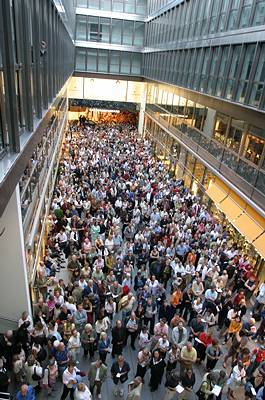|

Triumphs and failures
The first week of the Munich Opera Festival 2004
reviewed by TESS CREBBIN and SISSY KOTZEBUE
The Munich Opera Festival is one of the largest in the world, offering the most variety of operas. It also is set apart by the fact that the festival performances are happening following the regular seasons, whereas others festivals, like Bayreuth and Salzburg, do not have regular seasons. It is also Europe's oldest music festival, founded long before the other, now famous, European music festivals.
Traditionally, the festival opens with a free Opera Night, sponsored by the large German bank, Hypo-Vereinsbank. This year, the opening night took place on Saturday, 26 June, starting at 7:45 pm and going on into the wee hours of morning. As usual, it was a real crowd puller. Half of Munich seemed to have turned out to enjoy the free classical music highlights on offer.

Crowds in Munich at the free opening night of the Summer Opera Festival. Photo © 2004 Hypovereinsbank
|
These included a mini-recital by world-class countertenor Axel Köhler, accompanied by Christoph Hammer, internationally known as a pianist, accompanist and conductor of early music.
Köhler sang in a most unlikely venue: the Hugendubel bookstore, where a Steinway grand piano most impressively towered above the rows of books. The acoustics were not the best and there was noise interference from people shopping, not to mention the stuffy air that leaves one wondering how it was possible to sing at all without getting a dry throat and producing hoarse sounds. But neither audience nor singer minded these drawbacks, and Köhler performed to perfection.
'Of course, one has to fight to keep the upper hand in a setting like this,' Köhler explained after the performance, 'but it is not that different to the background noise we have to deal with on an opera stage. The audience thinks that we have absolute quiet, but that is not true. There are people overhead, shifting lights back and forth, and there are people walking around backstage, which the singer can hear. So it was no big deal for me.'

Christoph Hammer. Photo © 2004 Anja Ulrich
|
In fact, Köhler so enchanted his audience that they'd have kept him for a dozen encores, given half a chance. The chance did not exist, since an organizer appeared toward the final part of the recital and tried to end the performance prematurely -- Hammer was needed as accompanist for another performance. Grimly determined to get every last little note out of Köhler, the audience crowded around piano and singer, shooing off the official who, more or less voluntarily, had to watch from afar while Köhler continued to sing every song on his list. No sooner had he finished and his applause was beginning to grow to a crescendo, the official made a run for Hammer, grabbed him and ran off to the next show, which started with a bit of delay.
Continue >>
Copyright © 5 July 2004
Tess Crebbin and Sissy Kotzebue, Germany

|

